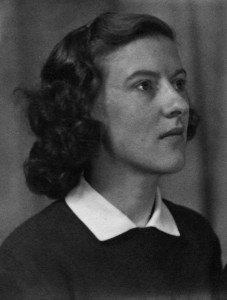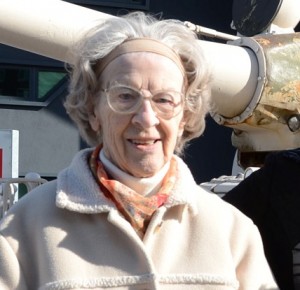When an old person dies it is traditional to look back over their whole life, starting at the beginning and ending at the end. However, in the course of my work researching the social history of the Second World War I inevitably enter the latter part of people’s lives. The risk of talking to someone about what happened seventy years ago is that their memory becomes coloured by the tint of history or by the influence of collective memory. Peggy Sumner was different. There was a freshness about her wartime memories that was captivating and believable. When describing her first WI meeting in Dunham Massey in 1938 she brought a lost-world to life:
‘Everyone was wearing heavy coats, hats, gloves, good solid thick stockings and well-soled shoes or boots. The predominant colour was black or navy blue and these were top coats that had been bought to last a lifetime. People were still in mourning from the Great War which had ended twenty years earlier and some of the coats dated from that era. The room itself was always cold. You had to push the emergency bar on the inside of the school room door to get into our room, which brought with it an icy blast of cold air in the winter. There were heating pipes around the room but they could not compete with the draughts, so we all kept our coats, gloves and hats on throughout the meetings.’

I remember from my own school days those huge black heating pipes that burned your legs if you got too close to them but were useless against draughty doors and windows. In fact, our classrooms were a series of micro-climates which could almost certainly have sustained a variety of different forms of life, from polar bears to scorpions.
The president, Mrs Hughes, ran a tight ship and kept her committee in order. In the end she ran Dunham Massey WI for over a quarter of a century and in all that time Peggy and her sister Marjorie were members. There was little time for chit-chat. Peggy likened the meetings to church but she had a twinkle in her eye when she remembered the cakes. Even during the war the membership eschewed biscuits in favour of cakes. Biscuits were just not acceptable, she said simply:
‘The only time we talked was when the tea came round and the cakes were handed out. If you were at the end of the row you had to hope that a nice-looking cake you had spotted would not have been taken by the time it got to you.’
Last time I saw Peggy was in her house in Hale, near Altrincham. She had lived in the house with her sister since before the Second World War and although there were some modern details, it was essentially a 1940s house with a few 21st century trimmings, such as books and cards. Yet Peggy’s presence was anything but old or dusty. She was full of ideas about what WI outings she would like to take part in, even if her horizons were somewhat narrowed by her ninety-plus years. But she was also enthusiastic about what opportunities the WI was able to offer some of the newer, younger members who were just starting out on what she clearly thought was a great adventure.
‘The great thing about the WI is that you are one of a few who are all trying things out. I have seen members scared to open their mouths when they first joined who have ended up as President or on the county committee.’

Peggy had that rare ability to telescope the years so that she was as at home talking about the 1940s as she was the 1990s or even the 2010s, if that is what they are now called. When I was reflecting last night on her long life it came to me that what Peggy Sumner was able to express was the spirit that never aged in her. She might have become frail and elderly but inside her mind was a seventeen year old girl who turned up at her first WI meeting and joined a family that lasted for over 77 years. Peggy did not have a career as such, nor did she push herself forward to take the lead in things but she lived a full and happy life and made other people’s lives better simply for being there. What a remarkable lady. She will be much missed. I am proud that her memories are perpetuated in Jambusters.

